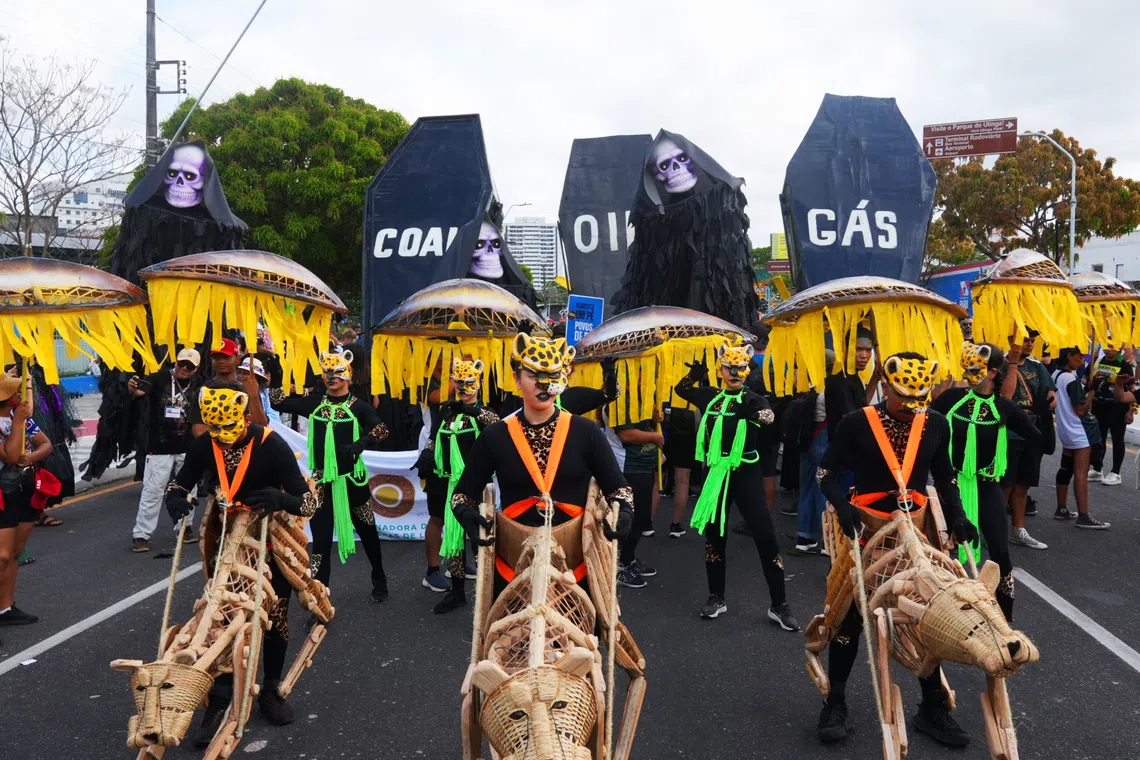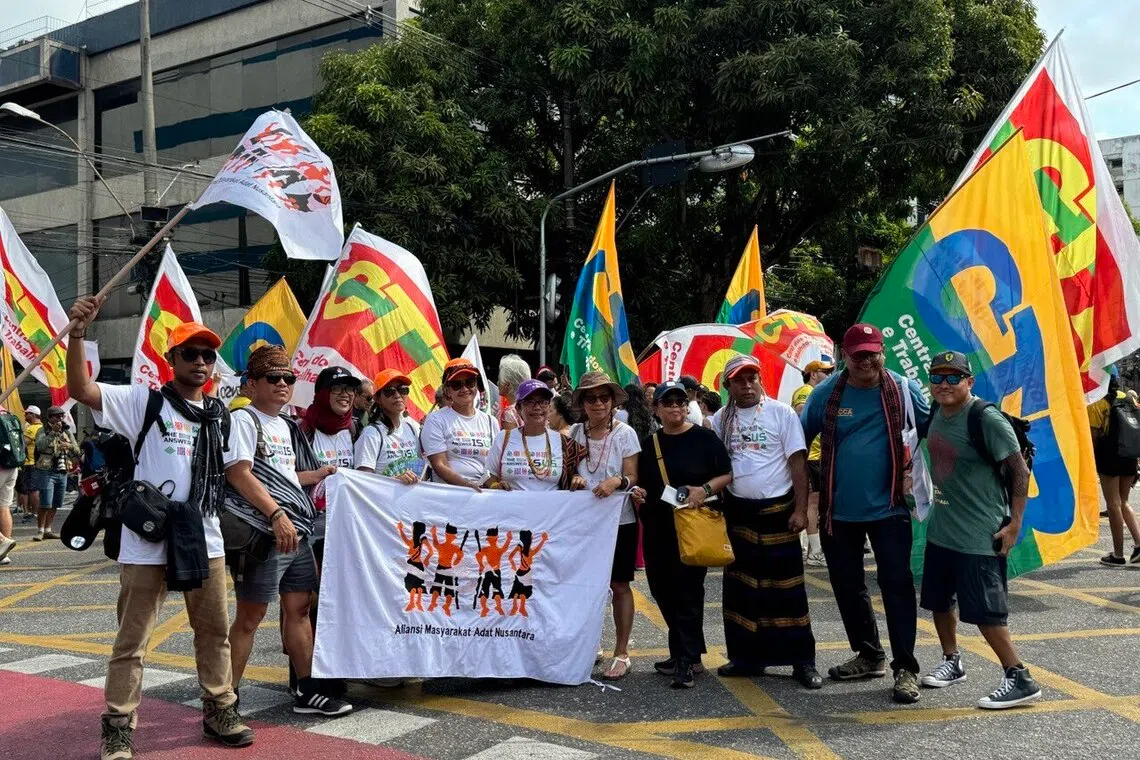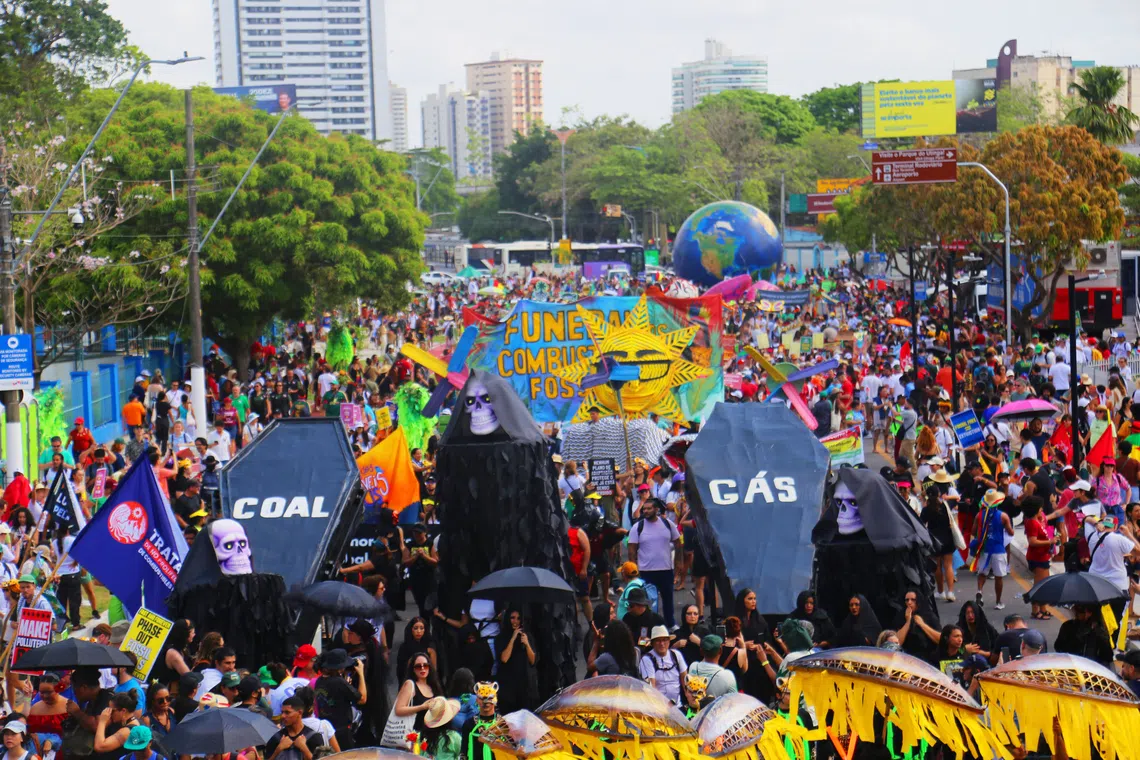BELEM, Brazil – As COP30 enters its politically charged second week, momentum against fossil fuel use has grown after campaigns urging stronger action against the biggest driver of climate change.
More countries pledged at the event to wean themselves off fossil fuels, although pressure from countries dependent on oil and gas exports made discussions on the green energy transition fraught.
For instance, Cambodia, South Korea and Bahrain on Nov 17 committed to working to accelerate the phase-out of the use of oil, gas or coal in favour of clean energy.
Cambodia was the 18th member to support the Fossil Fuel Treaty, which is a network spearheaded by a bloc of Pacific nations to phase out the three key fossil fuels.
Meanwhile, South Korea and Bahrain were initiated into the Powering Past Coal Alliance that Singapore is also part of.
By joining the alliance, the Korean government announced its plan to stop building new unabated coal power plants and phase out 40 coal power plants by 2040.
But many petrostates, like those in the Middle East which derive large proportions of their revenue from oil and gas, have argued that planet-warming emissions could also come from other sources, such as from the agriculture sector and deforestation.
Such countries are known to have preferred to focus discussions on reducing emissions via “multiple pathways”, such as by promoting the use of carbon capture technology, instead of singling out fossil fuel use.
This year’s UN climate conference has also come under scrutiny over fossil fuel participation, after an analysis by activist group Kick Big Polluters Out reported that there were more than 1,600 fossil fuel lobbyists in attendance.
Despite being at the heart of the climate crisis, fossil fuels are historically one of the most contentious issues at the annual conferences. For one, it took nearly three decades’ worth of UN climate talks before countries finally committed, for the first time, to transitioning away from the planet-warming power sources in 2023.
This commitment appeared to waver in 2024, with the need to transition away from fossil fuels disappearing from the final text at COP29, hosted by the fossil fuel-dependent economy of Azerbaijan.
Now, the Brazilian host of COP30 is determined to place the call for a global fossil fuel phase-out back in the centre of the discussions. Brazil’s President Luiz Inacio Lula da Silva had reignited such talks ahead of the climate conference, when he called on world leaders to draw up road maps to overcome a dependence on fossil fuels.
During the summit, Brazil’s Environment Minister Marina Silva also urged countries to have the courage to address the need for a fossil fuel phase-out, calling it an “ethical” response to the climate crisis.
More than 60 countries have so far backed the proposal for a road map, Brazil’s National Secretary of Urban Environment, Water Resources and Environmental Quality Adalberto Maluf told participants at a discussion held at the Singapore Pavilion on Nov 18.
There are about 195 parties to the Paris Agreement.
At COP30, civil society groups from South-east Asia also called on their governments to heed the call for a transition away from fossil fuels.
In Asean, fossil fuels form 79 per cent of its energy mix, making the energy sector the largest source of harmful greenhouse gas emissions in the region, said the coordinator of civil society group Climate Action Network South-east Asia Nithi Nesadurai on Nov 15 at a press conference.
“While countries say that they are committed to increasing renewable energy and reducing emissions, at the same time they are also increasing the production and use of fossil fuels,” he said.
Mr Nesadurai noted that the region is rich in renewable energy potential, but that its infrastructure needed major upgrades to accommodate the renewable energy sources.

Despite being at the heart of the climate crisis, fossil fuel is historically one of the most contentious issues at the annual conferences.
PHOTO: ARTYC STUDIO
A just approach to the transition is also needed to avoid exacerbating economic inequalities, he said.
Also speaking at the conference was deputy executive director of the Philippines-based Centre for Energy, Ecology and Development Avril De Torres.
South-east Asia is heating up at twice the global average rate, she said, and remains the “last
bastion of coal
and an emerging hub for gas and liquefied natural gas”.
She added: “We have 43 GW (gigawatts) of coal and 136 GW of gas still planned for expansion.
“Many of these projects sit inside or dangerously close to protected areas, conservation zones and critical habitats.”
“The biggest historical emitter, the United States, is absent here at COP, despite showing up at the Asean Summit in Malaysia,” noted Ms De Torres.
“Asean must show zero tolerance for climate obstruction. We should not be pressured to be locked in to long-term deals for US liquefied natural gas, using tariff threats as leverage. And our governments should not allow Global North countries to derail their responsibility to phase out fossils and act urgently on the climate crisis,” she said.
The Global North refers to countries characterised by high levels of economic development.
Meanwhile, UN environment and development negotiations reporting service Earth Negotiations Bulletin’s COP30 team leader Jennifer Bansard noted resistance from countries with economies that are heavily reliant on oil and gas.
Given the pushback, she expressed doubts that the fossil fuel language will be mentioned in a cover decision, which is a decision that is not mandated in the negotiations.
Beyond the COP30 venue, campaigns against fossil fuels spilled onto the streets of Belem.
On Nov 15, an estimated 50,000 people braved the tropical heat to march for a host of climate-related issues, which ranged from promoting climate solutions to calling for the protection of Indigenous rights. As part of the march, a funeral for fossil fuels was held with giant coffins labelled coal, oil and gas, as demonstrators called for the end of oil exploration in the Amazon and the worldwide phase-out of fossil fuels.

Demonstrators from Indonesia’s Indigenous Peoples Alliance of the Archipelago on Nov 15 in Belem.
ST PHOTO: ANG QING
Director of international green group 350.org’s branch in Latin America and the Caribbean Ilan Zugman said the funeral was held to symbolically bury fossil fuels, which is the root of the crisis threatening human lives.
“What is missing is political courage to break once and for all with oil, gas and coal. It is time to put these old fuels where they belong – in the ground of history.”
The protests around the city are the first since the 2021 conference, due to restrictions in previous host countries.
Among those showing up was Indonesian Rukka Sombolinggi, the head of the Indigenous Peoples Alliance of the Archipelago, who flew 50 hours from Jakarta to represent concerns by indigenous people about the impact of new energy projects like hydropower and biofuel projects on their homes.
The Sulawesi native said: “We want to let the world know that we are not alone, that we can do this only if we are together.
“Indigenous people, we protect our forests, our environment, our lakes, our rivers and our oceans, not only for us but for everyone.”

